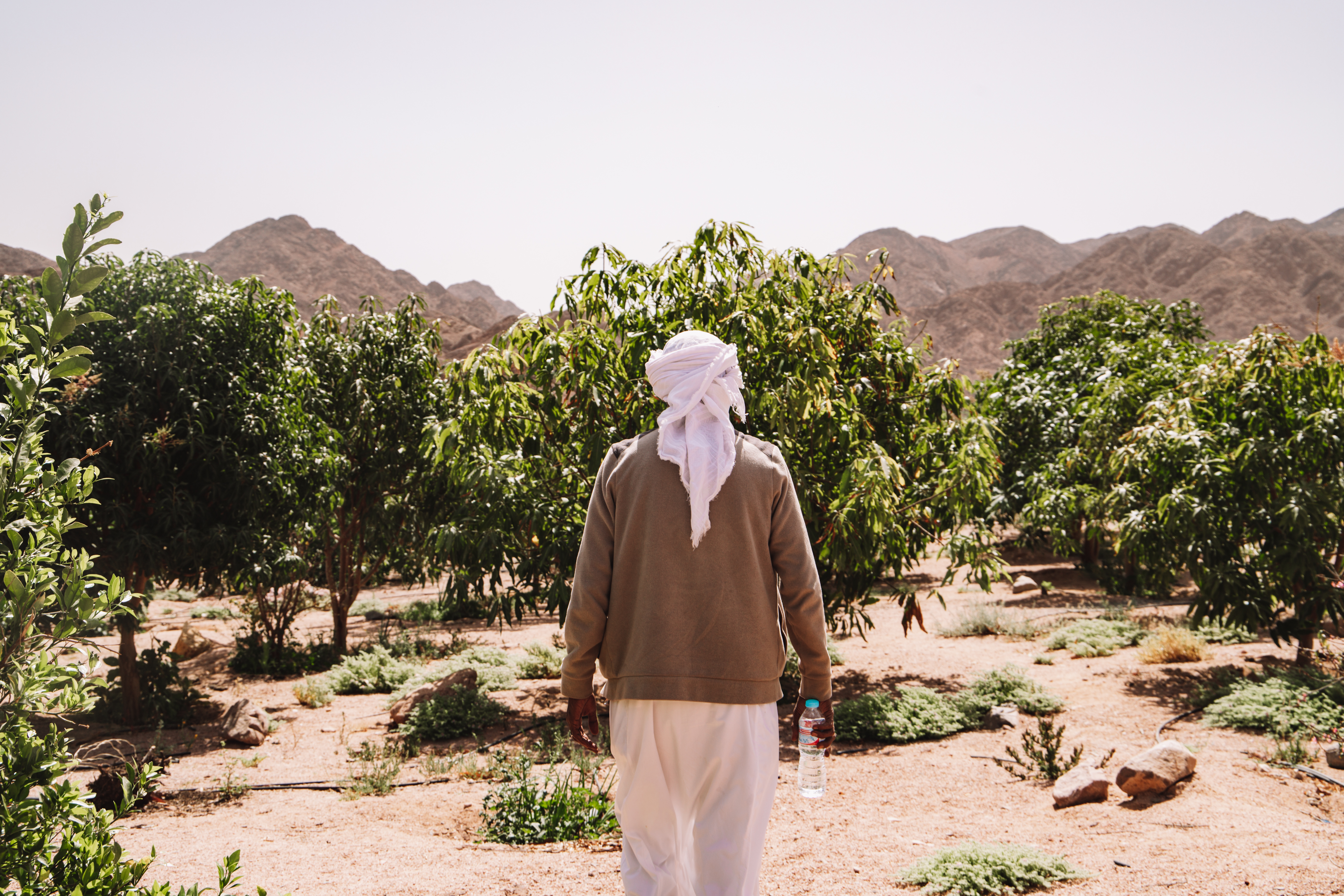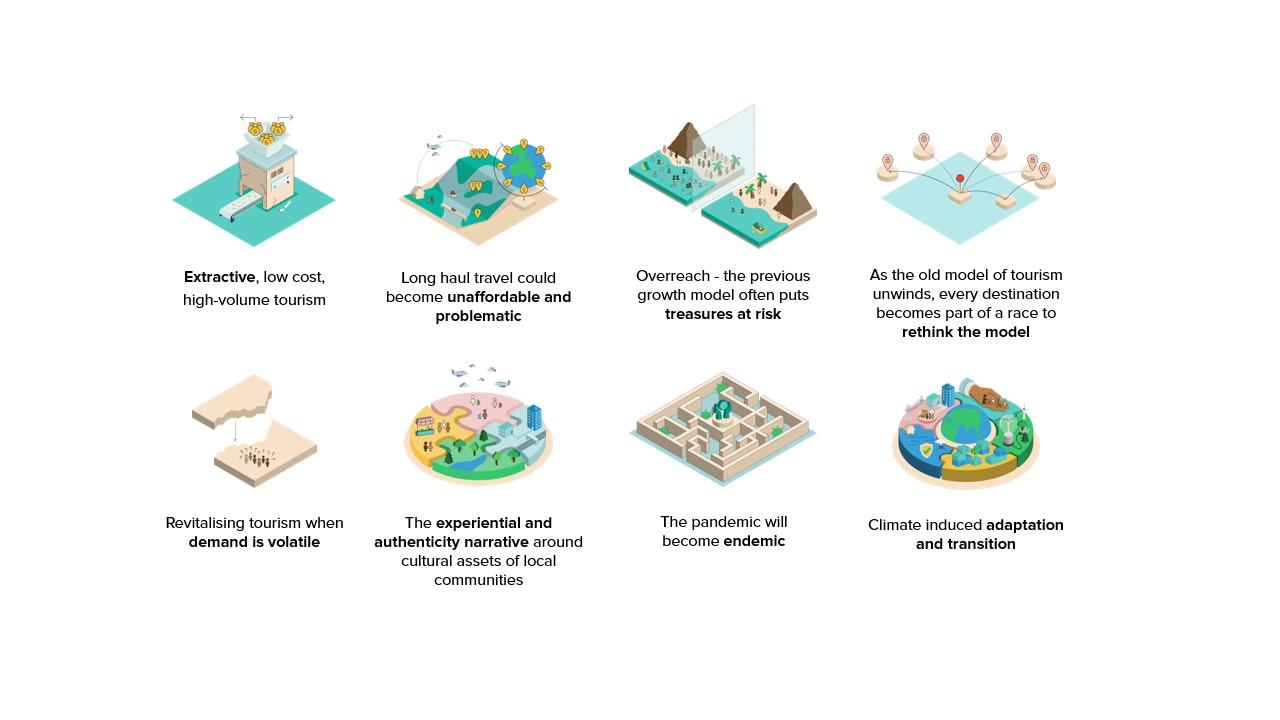Yomna Mohamed, Head of Experimentation
A sustainable tourism model transforms economic development: the Egypt case study
September 18, 2022

Egypt is a world-renowned touristic destination. Tell someone you are visiting Egypt, and the pictures immediately come into focus: the iconic pyramids of Giza, with the mysterious Sphinx standing guard; the beautiful beaches along the coast, warm and inviting; the vibrant and bustling bazaars, infused with the legacy of the pharaohs, teeming with the rich cultures of its people.
As the top destination for tourists visiting North Africa, how might Egypt evolve its tourism industry into a sustainable engine for economic development – particularly as the world emerges from the pandemic? More fundamentally, might tourism sector provide an opportunity to rethink the development model capable of withstanding & thriving in the context of interlinked, largely unpredictable and fast-moving crises – from food security and changing climate, to rapid inflation, polarization, economic downturn & inequality?
This is the critical question facing UNDP Egypt, one of nine country offices selected by UNDP’s Strategic Innovation Unit to join the second cohort of Deep Demonstrations, an initiative financed by the Government of Denmark.
In this post, we detail the context for tourism in Egypt, consider emerging trends in the economic model, and share progress to date in shaping broader system transformation.
The Egyptian Context
Egypt is best characterized as a Low-Cost Mass Tourism Magnet. According to the IMF, the tourism industry employed 10 percent of the population and contributed to about 12 percent of GDP pre-pandemic. Egypt ranks first in Africa, fifth in MENA, and 51st globally in the travel and tourism development index (TTDI). It is a top performer in the MENA region with regards to environmental sustainability (31), natural and cultural resources (33), and business and cultural travel (22). With over 100 million in population, Egypt is both a prime destination for nature-based activities and a home to rich cultural diversity.
Despite being one of the top performers in the world on price competitiveness, it only ranks 3rd in the MENA region for tourism earnings. Safety and security concerns remain big issues as well, as the country ranks in the bottom half globally at 112.
The macro trends also suggest more trouble ahead. While the pandemic has definitely been an accelerant, the combination of economic factors and new norms that underpin global tourism raise fundamental questions about long-term viability (see fig 1). Even as the global airline industry recovers from the pandemic, the costs of long-haul travel have become increasingly unaffordable – not only in the rising price of fuel but also in its contributions to climate change. The unexpected benefits of lockdown, improved environments and ecosystems, have countries questioning whether they want to return to the risky, crowded, over-reaching pre-pandemic world. And COVID-19 has magnified the vulnerability of local communities who already do not benefit from unsustainable tourism.

This requires rethinking the model entirely. The circumstances call for collective effort that transforms the system to one based on sustainability, resilience, and putting local communities first.
Looking at the adjacent possible – the north start & entry points for transforming systems
In response, UNDP Egypt has embarked on a journey to rethink the tourism model and develop a portfolio of policy options on sustainable tourism that align with national priorities.
This approach relies not on a singular discrete intervention but a full system-wide transformation. The adaptive framework is designed to continuously learn from experience and detect new opportunities or needs in the system. A portfolio-based approach serves as a dynamic repository of strategic ideas that frame policy, an investment pipeline for funders, and a coordinating mechanism for relevant stakeholders.
In order to design this portfolio, it is necessary to start with strategic intent. This involves three specific actions –
1. Create a shared vision at the national level:
This frames the possibilities for a transformative agenda and mobilizes stakeholders to build sustainable, innovative tourism in Egypt. A critical mindset shift is seeing investment in the population and nature as an investment in tourism, where tourism becomes an entry point for rethinking the country’s existing development paradigms.
2. Reimagine a tourism industry that benefits all:
These include activities that strengthen climate resilience and deliver sustainable benefits to local communities at the forefront.
3. Expand the diversity of business models:
By focusing on innovative and integrated experiences for tourists, Egypt can accelerate and drive sustainable growth in the industry.
Informed by this strategic intent, existing models, and portfolio ambitions, we have identified three main shifts to create in conjunction with our partners and stakeholders, showcased in fig 2.

As innovation advisors, we have learned to trust the process. Through this system transformation framework, two parallel but complementary pathways have emerged –
1. Continuously exploring and deeply learning the needs and opportunities in the system; and
2. Identifying key policy options that accelerate the investment pipeline
We are taking these shifts and translating them into specific and coherent offers to be pursued with partners. A sample of these is shown in fig 3.

fig 3. Three Shifts, in Practice
A system transformation is premised on collective action and stakeholder engagement around a coherent approach. In this deep demonstration on sustainable tourism, we embarked on a journey to learn about the problem space, design a portfolio of policy options, and activate a set of evidence-based interventions. We have yet to determine where best to introduce this portfolio of interventions, but we invite all potential partners to learn alongside and act with us as we work together to make tourism a sustainable economic engine in Egypt.

 Locations
Locations